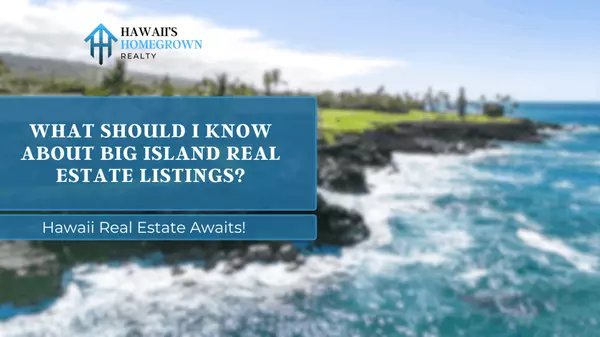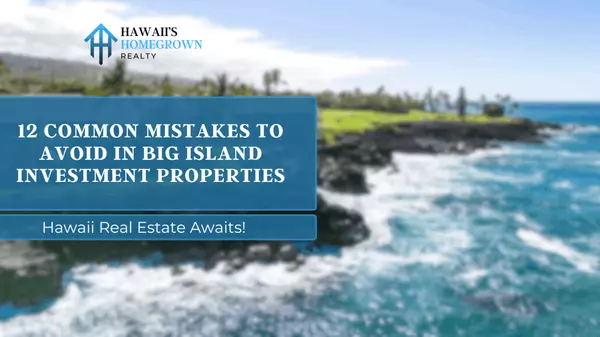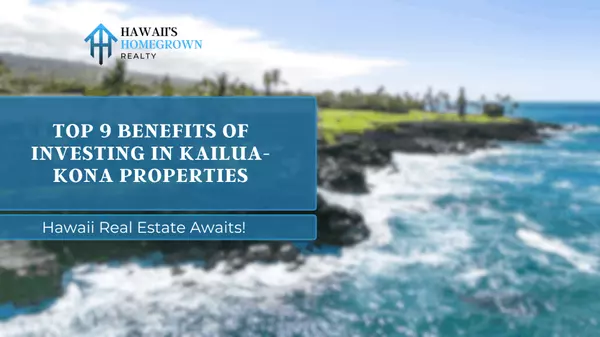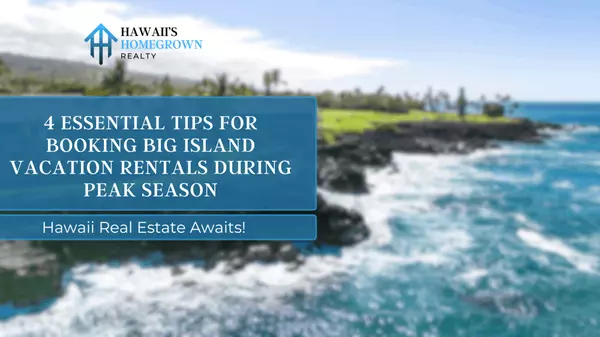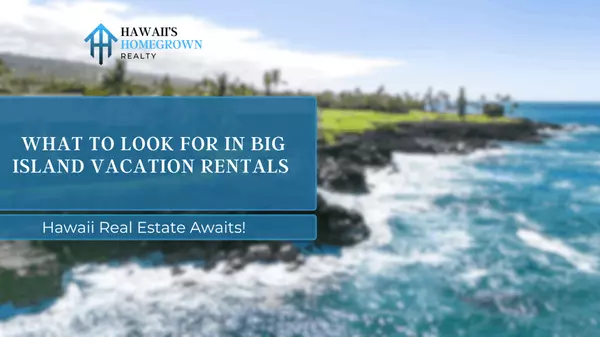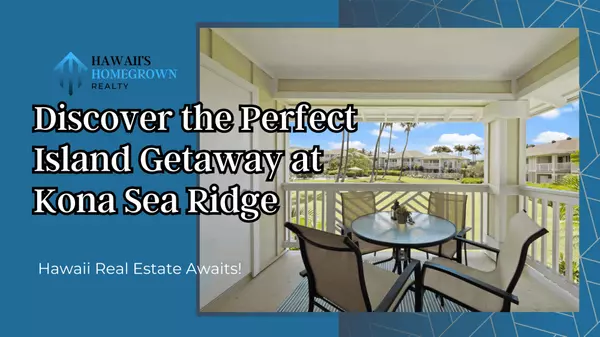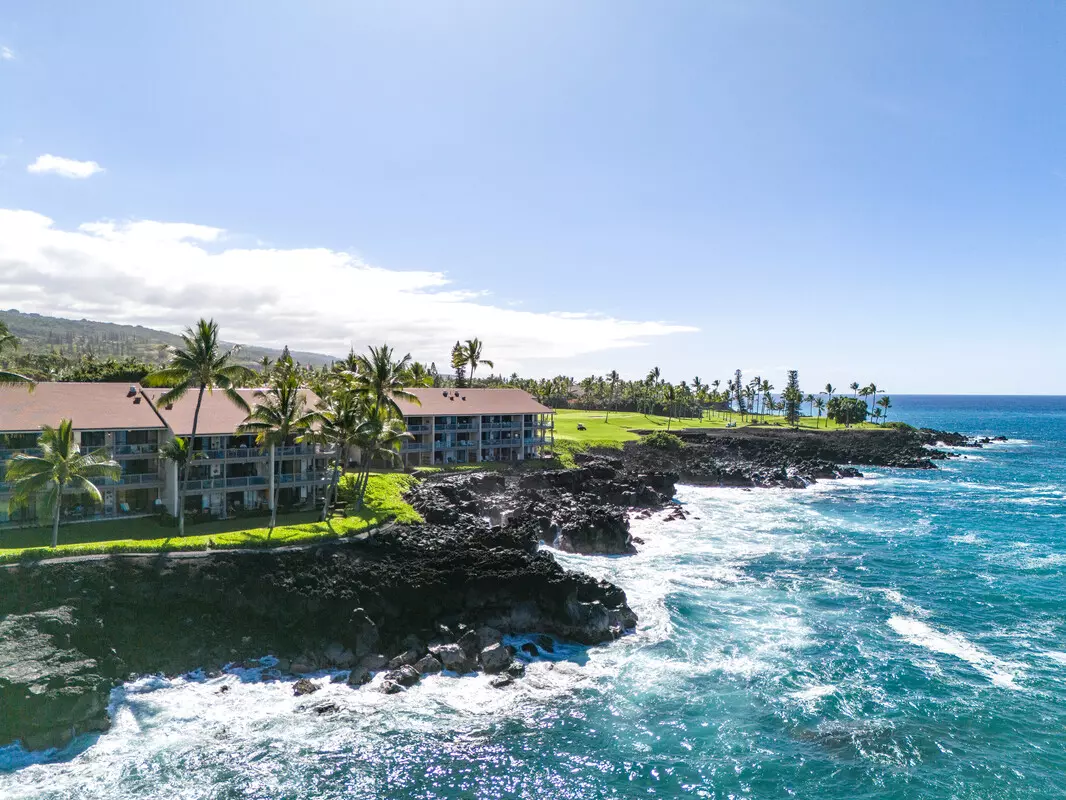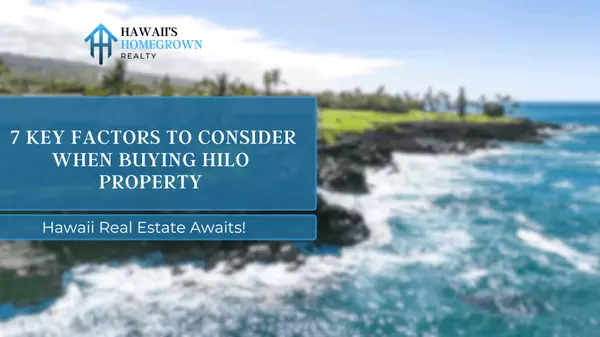
7 Key Factors to Consider When Buying Hilo Property
If you’re drawn to the charm of Hilo and the unique beauty of Hawai’i Island, purchasing property here might be on your horizon. However, the process involves several factors distinct to Hilo that prospective buyers should consider to make an informed decision. Let’s explore the key considerations when buying Hilo property, whether for a home or an investment. Climate and Weather Patterns Hilo is known for its lush, green landscape, courtesy of being one of the rainiest cities in the United States. The frequent rainfall contributes to the area’s natural beauty but can also affect property maintenance, especially regarding moisture control and mold prevention. Homeowners should be prepared for additional upkeep in this regard, such as regular inspections of roofing, gutters, and landscaping. Additionally, be sure to check whether your home has features like dehumidifiers or mold-resistant materials to keep the property in good shape over time. Location Within Hilo Hilo property options range from oceanfront homes to lush, mountainous hideaways, with each area offering unique benefits and challenges. While a coastal property offers scenic ocean views, it may also face issues such as salt air corrosion or heightened flood risk. In contrast, properties located more inland may have more protection from storms but might not offer the same direct ocean views. Research neighborhoods based on your lifestyle needs—whether that’s proximity to Hilo’s town center, schools, or quieter, secluded areas. Flood and Lava Zone Designations Hilo lies in a region where understanding flood and lava zones is crucial for potential homeowners. The Federal Emergency Management Agency (FEMA) designates flood zones, and areas closer to the coast or rivers may require additional flood insurance. Hawai’i County also categorizes land into nine lava zones based on volcanic activity risk, with lower numbers indicating higher risk. Check the lava zone of any Hilo property you’re interested in and understand the implications for insurance coverage and potential risks associated with living in a volcanic region. Local Building Codes and Permits Buying property in Hilo, especially if you’re considering renovation or expansion, requires a clear understanding of Hawai’i County’s building codes and permitting processes. Hawai’i has regulations designed to preserve its unique environment and protect against natural disasters. Familiarize yourself with local zoning laws, and ensure that any existing structures have been permitted correctly. When buying a Hilo property, request documentation verifying compliance with these regulations to avoid issues later. Access to Amenities and Services Consider how close your Hilo property is to essential amenities and services. Hilo offers a range of amenities, from shopping and dining to healthcare and recreational facilities. If you’re planning to live there full-time, assess the accessibility to medical services, schools, grocery stores, and community centers. Proximity to these facilities can enhance your daily quality of life and also play a role in property valuation over time. Sustainable Energy Options Hilo’s geographic location makes it a strong candidate for renewable energy options, such as solar power, which is increasingly popular across Hawai’i. Since utility costs can be high in Hawai’i, sustainable energy options could save on long-term expenses and provide environmental benefits. When buying property, inquire about existing energy solutions and consider properties with solar panels or other eco-friendly amenities. Property Values and Market Trends Like much of Hawai’i, Hilo’s real estate market can be highly dynamic. Market conditions, the availability of properties, and the unique appeal of Hilo can cause fluctuations in property values. Research current market trends in Hilo to get a sense of property appreciation rates, seasonal changes in pricing, and future projections. Working with a local real estate agent who understands Hilo property can provide insight into the market dynamics, helping you determine when and where to buy to optimize your investment. Final Thoughts Buying Hilo property is a unique experience with its own set of challenges and rewards. By considering these seven key factors, you can make an informed decision and enjoy the benefits of owning a slice of paradise in Hawai’i. Remember, a knowledgeable real estate agent can be invaluable as you navigate the market, and their local expertise can help ensure you find the perfect Hilo property to suit your needs and lifestyle.
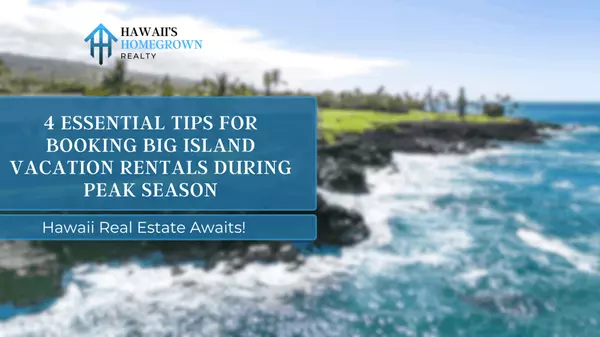
What Do I Need to Know About Hawaii Housing Laws Before Buying a Home on the Big Island?
Purchasing a home on the Big Island of Hawaii is an exciting venture, but it’s essential to understand the unique housing laws that apply to this beautiful and diverse state. Hawaii housing laws are designed to protect buyers and ensure smooth transactions, but they differ from laws in the mainland U.S. Before you make a commitment, here’s what you need to know about Hawaii housing laws to help you navigate the home-buying process with confidence. Leasehold vs. Fee Simple Property One of the key distinctions in Hawaii real estate is between leasehold and fee simple ownership. Most mainland buyers are familiar with fee simple properties, where you own both the land and the building. However, in Hawaii, many properties are leasehold, meaning you own the building, but the land is leased from another party. Leasehold properties can offer lower purchase prices, but the lease terms can affect long-term costs and property value. Before buying, it’s crucial to understand the details of any leasehold property, including the length of the lease, rent payments, and whether the lease can be renewed or converted to fee simple. Zoning and Building Restrictions The Big Island’s diverse landscapes range from lush rainforests to volcanic rock formations, and zoning laws are designed to protect these natural resources. Hawaii housing laws establish strict zoning regulations that dictate what can be built and where. If you’re planning to build or renovate a home, you must comply with county zoning restrictions that determine property usage, building heights, and land development. Certain areas, especially those near volcanic activity zones or protected wildlife habitats, may have additional building restrictions to consider. Always consult local regulations before making plans for new construction or significant renovations. Property Taxes and Assessments Hawaii has relatively low property tax rates compared to many mainland states, but it’s important to understand how these taxes work on the Big Island. Property taxes are based on the assessed value of the home, and rates can vary depending on whether the property is used as a primary residence, second home, or rental property. The state offers exemptions for owner-occupied homes, which can lower your tax bill if you plan to make the Big Island your permanent residence. Additionally, be aware of special assessments, which may be levied for community improvements or to cover damages from natural events like volcanic eruptions. Disclosure Laws Hawaii housing laws require sellers to provide buyers with a Seller’s Disclosure Statement, which outlines any known defects or issues with the property. This law is designed to protect buyers by ensuring full transparency in the transaction. Sellers must disclose material facts that may affect the value of the property, such as previous termite infestations, flooding history, or proximity to lava zones. As a buyer, carefully review these disclosures and ask follow-up questions if anything is unclear. Natural Hazard Zones The Big Island’s unique geography includes active volcanoes and areas prone to natural hazards such as lava flows, earthquakes, and tsunamis. Hawaii housing laws require full disclosure of properties located in natural hazard zones. For example, properties near Kilauea, an active volcano, are categorized into different Lava Hazard Zones based on the risk of lava flow. It’s vital to understand the risk factors for properties located in these zones, as it can impact insurance premiums and future property values. Homeowner Association (HOA) Rules If you’re considering buying a home or condo in a planned community, be sure to familiarize yourself with the HOA rules and regulations. Many Big Island developments have HOAs that manage community amenities and enforce rules about property upkeep and usage. HOA fees can add to your monthly expenses, and the association may have restrictions on things like short-term rentals, exterior modifications, or landscaping. Make sure you’re comfortable with these rules before purchasing in an HOA-governed community. Short-Term Rental Regulations With the popularity of vacation rentals in Hawaii, many buyers are interested in properties they can rent out for short stays. However, Hawaii housing laws include strict regulations on short-term vacation rentals, especially in residential areas. Before purchasing a property with the intent to rent it out short-term, make sure it complies with local ordinances. Some areas of the Big Island may require special permits for short-term rentals or limit the number of rental days per year. Violating these laws can result in fines and penalties, so it’s important to research thoroughly. Conclusion Buying a home on the Big Island is a dream for many, but understanding Hawaii housing laws is crucial to ensure a smooth and successful transaction. From zoning regulations and property taxes to natural hazard disclosures and short-term rental laws, being informed will help you avoid potential pitfalls and protect your investment. If you’re ready to dive deeper into the specifics of Hawaii housing laws or need assistance with your home search, contact us today! We can help guide you through the process and ensure you find the perfect property on the Big Island.
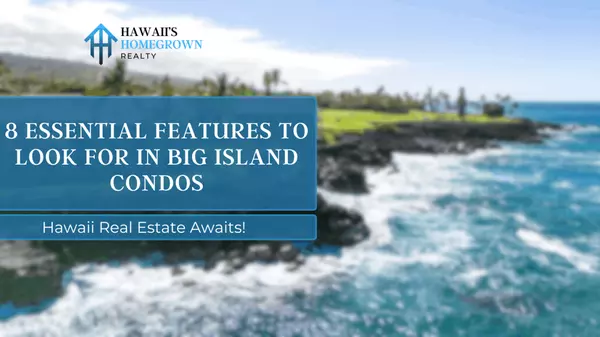
8 Essential Features to Look for in Big Island Condos
The Big Island of Hawaii is known for its diverse landscapes, stunning beaches, and rich cultural experiences. Whether you’re planning to relocate, buy a vacation home, or invest in a rental property, condos on the Big Island offer a blend of luxury, convenience, and access to the island’s most beautiful spots. But with so many options available, how do you choose the perfect condo? Here are eight essential features to look for in Big Island condos to ensure you’re making a smart investment. Prime Location Location is always a top priority when buying real estate, and it’s no different when it comes to Big Island condos. Whether you’re drawn to the sun-drenched Kona coast or the lush, green surroundings of Hilo, the right location will depend on your lifestyle preferences. Proximity to beaches, shopping centers, dining spots, and attractions like national parks can enhance your quality of life and increase rental demand if you’re purchasing as an investment. Ocean Views and Beach Access A major appeal of owning property on the Big Island is its breathtaking ocean views. Many condos offer expansive balconies or lanais that overlook the Pacific, providing a serene escape. Having direct or easy access to nearby beaches is another valuable feature. Imagine waking up to the sound of the waves or strolling to a secluded beach at sunset—these are priceless aspects of island living that are well worth considering when searching for Big Island condos. Resort-Style Amenities One of the reasons people gravitate towards condo living is the access to high-end, shared amenities. Many Big Island condos come equipped with resort-like features, including swimming pools, fitness centers, spas, and tennis courts. Look for a property that offers the amenities you value most. If you’re buying as a rental investment, these perks are huge draws for tourists who want to enjoy a resort experience without staying in a hotel. Security and Privacy Safety and privacy are crucial when choosing a condo. Look for properties with 24/7 security, gated entries, and surveillance systems. These features ensure peace of mind whether you’re living there full-time or renting the unit out to guests. Some luxury condos even offer concierge services, enhancing the sense of safety and exclusivity. Outdoor Living Spaces The tropical climate of the Big Island makes outdoor living a central part of island life. Look for condos that maximize outdoor spaces, offering private lanais or balconies, communal BBQ areas, or rooftop terraces where you can enjoy the warm weather and panoramic views year-round. Outdoor spaces are ideal for entertaining, relaxing, or soaking up the Hawaiian sun in the privacy of your own home. High-Quality Interior Finishes When you invest in a condo on the Big Island, you want it to feel like a luxurious retreat. Many condos feature upgraded interior finishes, including granite countertops, hardwood flooring, and high-end appliances. Pay close attention to the materials used in the kitchen, bathrooms, and living areas. Quality craftsmanship not only improves the aesthetic appeal of the condo but also increases its value over time. Energy Efficiency and Sustainability Hawaii is a leader in sustainability efforts, and this extends to real estate. Look for condos that incorporate energy-efficient appliances, solar panels, and eco-friendly building materials. Some developments focus on sustainability through water conservation, recycling programs, and green landscaping. These eco-conscious features not only reduce utility bills but also contribute to preserving the island’s natural beauty. HOA Fees and Regulations When purchasing a condo, it’s essential to understand the homeowners association (HOA) fees and what they cover. These fees typically go toward maintenance of common areas, amenities, and building insurance. Make sure the HOA has clear guidelines, and check whether they have any rules that may impact how you use your property, especially if you plan to rent it out as a vacation rental. High HOA fees can significantly impact your monthly budget, so be sure to factor them into your overall costs. Conclusion Investing in a condo on the Big Island is more than just purchasing a home—it’s embracing a unique lifestyle that blends natural beauty with modern conveniences. As you search for the perfect Big Island condo, consider these essential features to ensure your property suits your needs, whether for personal use or as a rental investment. Ready to start your search? Explore available Big Island condos [here] and find your piece of paradise today!
Recent Posts
